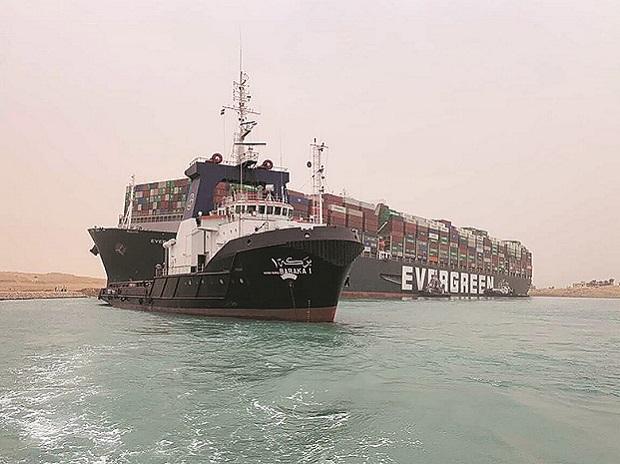Global freight sails out of the digital dark ages, aided by start-ups

If suppliers in China fail to pick up freight containers to fill an order for MediaShop, Marcel Schneider gets an alert via a digital freight system, allowing the retailer to reach out and fix the problem swiftly.
Before July 2020, Austria-based MediaShop’s deputy supply chain director says he would discover problems in his supply chain only when containers failed to arrive in Hamburg as scheduled. “It was like being in a tunnel where you had only a limited view of what was going on,” Schneider said.
Lost containers means lost sales for MediaShop, which sells consumer goods ranging from kitchen knives to fitness equipment.
A missing load can mean the company pays penalties to wholesale customers for late shipments.
Global supply chain snarls, from shortages of freight containers in China to a blockage in the Suez Canal, have thrown a wrench into the recovery from the Covid-19 pandemic. They have also accelerated the freight industry’s shift out of the digital dark ages. That’s benefiting a fast-growing cluster of start-up companies that had struggled to sell their software-powered freight tracking technology, until now.
A Reuters analysis of digital freight start-ups shows there are close to 250 companies globally, including Uber’s logistics arm Uber Freight, and some Chinese operators looking to go public like Full Truck Alliance.
“Really, the pandemic gave us a chance to shine, with capacity being taken offline and demand surging in unpredictable ways,” says Ryan Petersen, Chief Executive Officer of San Francisco-based Flexport, a freight forwarder whose revenue almost doubled to $1.27 billion last year and which has raised $1.3 billion from investors. MediaShop is a client.
Digitisation in the freight industry has been under way for years, but the expense of grafting digital tracking systems onto legacy databases has discouraged many companies.
Now, a number of start-ups staffed by alumni of tech companies like Facebook, Amazon and Uber have developed platforms that integrate with customers’ transportation management systems, making them easy to use from home “We have seen a massive acceleration in products that normally wouldn’t have been adopted for three, four or five years from now because people have had to figure out how to operate remotely,” said Sune Stilling, former head of growth at the venture capital arm of shipping giant Maersk, which has invested in several of these start-ups. Deep-pocketed traditional freight giants are also beefing up their own systems to compete. But smaller companies may find it hard to fund the transition to digital, which should drive consolidation, especially in the freight forwarding industry.
‘Run you over’
Before Michael Wax founded Berlin-based digital freight forwarder Forto five years ago, he toured a traditional company’s offices in Hamburg and was shocked by the antiquated operations.
“We saw a bunch of white males there managing a lot of colored Post-It notes stuck around their computer screens, and running around with bits of paper,” Wax said. Forto has raised $53 million from investors, including Maersk Growth. Like Flexport, Forto built a software platform to handle shipments from factory to warehouse — including cumbersome customs declarations — online, with customers able to track containers as they are scanned at various points along the way.””We will orchestrate your entire supply chain for you,” Wax said. “This is the future of logistics.” Forto’s system integrates with transportation management systems developed by the likes of Oracle and SAP for major customers, making it easier for them to use. It also sells software to shippers as a standalone supply-chain tool. The company tripled its business in 2020. Integration with transportation management systems has also been key for Loadsmart, a US digital truck brokerage and Ofload, an Australian equivalent. When US customers, which include Home Depot, Coca-Cola and Kraft Heinz, book an order on their own transportation management systems, rather than having to reach out to a truck broker, they get an instant guaranteed quote from Loadsmart.
Loadsmart has raised $150 million from investors and saw its revenue jump 208 per cent in the fourth quarter of 2020. “The switch to digital used to be seen as a vitamin, now it’s a painkiller,” says Loadsmart CEO Ricardo Salgado. “If you don’t do it, your competitors are going to run you over.” Ofload launched in Australia in March 2020 as the pandemic hit hard and has companies with around 15,000 trucks combined using its system. Maersk Australia— also an investor — uses it to manage all of its freight, not just the loads booked using Ofload.
 Dear Reader,
Dear Reader,
Business Standard has always strived hard to provide up-to-date information and commentary on developments that are of interest to you and have wider political and economic implications for the country and the world. Your encouragement and constant feedback on how to improve our offering have only made our resolve and commitment to these ideals stronger. Even during these difficult times arising out of Covid-19, we continue to remain committed to keeping you informed and updated with credible news, authoritative views and incisive commentary on topical issues of relevance.
We, however, have a request.
As we battle the economic impact of the pandemic, we need your support even more, so that we can continue to offer you more quality content. Our subscription model has seen an encouraging response from many of you, who have subscribed to our online content. More subscription to our online content can only help us achieve the goals of offering you even better and more relevant content. We believe in free, fair and credible journalism. Your support through more subscriptions can help us practise the journalism to which we are committed.
Support quality journalism and subscribe to Business Standard.
Digital Editor
business-standard.com

